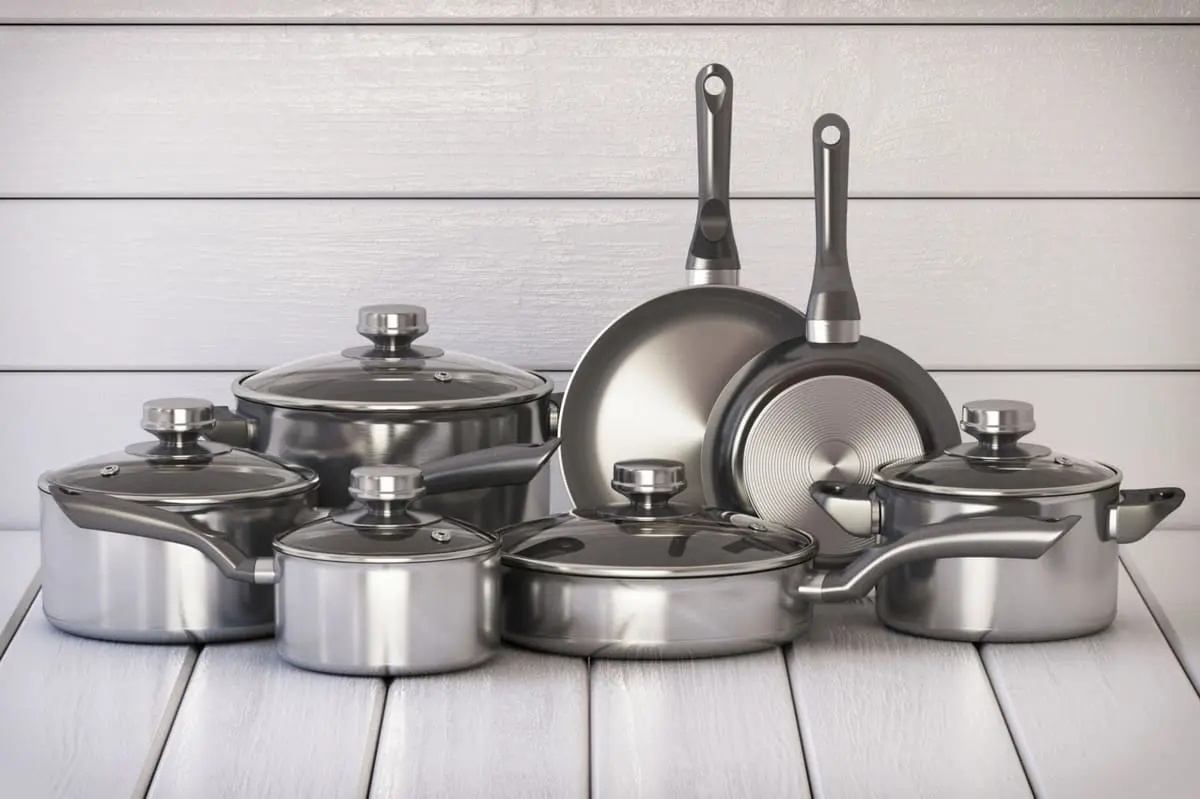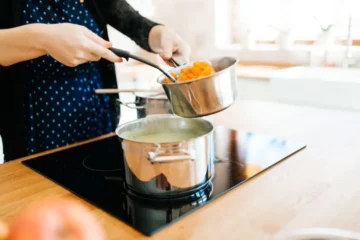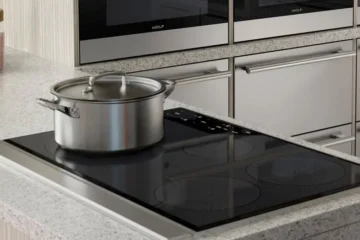If you have an induction cooktop, you may have encountered the term induction-ready when looking through induction cookware. What does this mean? And can you use aluminum pans on the induction cooktop?
This article explores induction-ready and whether you can safely use aluminum pans on induction cooktops. It will also look at the other materials that work with induction cooktops and help you decide which cookware to buy. Let’s find out!
What Does Induction-Ready Mean?
Induction-ready means that a product or material can be used with an induction cooktop. Induction cooktops use a magnetic field to heat the cookware, so only cookware that is made of a ferrous metal like cast iron or stainless steel will work. Some glass and ceramic cookware is also induction-ready if it has a ferrous metal disk bonded to the bottom.
Can You Use Aluminum Pans On Induction Cooktop?
You’ve just upgraded your kitchen with a shiny new induction cooktop, wondering if your old aluminum cookware will still work. The answer, unfortunately, is no. Aluminum cookware, unfortunately, won’t work with induction cooktops because aluminum itself isn’t magnetic. This is because the element’s crystal structure doesn’t allow for it.
Although some people have tried using aluminum pots and pans on their induction cooktops with mixed results, we don’t recommend it. The bottom line is that it’s best to invest in a set of cookware specifically designed for induction cooking to ensure you get the most out of your appliance.
How Can Aluminum be Used on Induction Cooktops?
When it comes to cooking, many different methods and materials can be used. Some people prefer to use gas stoves, while others prefer electric ones. And then some swear by using induction cooktops.
But what if you don’t have the right cookware to use with your induction cooktop? Don’t worry, because there are a few solutions.
Some cookware manufacturers, such as those offering aluminum or copper pans, have specially designed products with a magnetized base for induction cooktops. Another solution is to use a magnetic disc, which you can buy or make yourself, to magnetize your cookware.
How To Check Which Material Will Work On Induction?
There are several ways to tell if a particular material will work with induction cooktops. One way is to hold a magnet up to the bottom of the pot or pan. If the magnet sticks, then the pot or pan will work on an induction cooktop.
Another way to tell is to look at the bottom of the pot or pan. It will probably work on an induction cooktop if it has a smooth, flat surface. If the bottom is ridged or has a raised design, then it probably won’t work.
Some materials that work with induction cooktops include cast iron, enameled steel, some types of stainless steel, and some types of aluminum.
Can You Use Aluminum Cookware On An Induction Cooktop?
There has been some confusion about whether or not aluminum cookware can be used on an induction cooktop. The answer is no, and aluminum cookware cannot be used on an induction cooktop.
Aluminum is a conductor of electricity, and since induction cooktops work by creating a magnetic field, any metal object in the pot or pan will interfere with that field and prevent the cooktop from working properly.
So if you’re using an induction cooktop, it’s best to stick to cookware made from stainless steel, cast iron, or enameled cast iron.
Where Can You Use Aluminum Cookware?
Aluminum cookware is popular for cooking because it is affordable and durable. But where can you use it?
Stovetop food preparation is the most common use for aluminum cookware. It heats evenly and is a good choice for sauces, boiling water, and other liquid foods.
Baking is another great use for aluminum cookware. It conducts heat well and distributes it evenly, so your food will cook evenly. This is especially important for cakes and other delicate desserts.
Can You Use Hard Anodized Cookware On Induction Cooktop?
If you’re wondering whether you can use your hard-anodized aluminum cookware on your induction cooktop, the answer is usually no. The natural aluminum in hard-anodized cookware doesn’t contain enough iron or magnetic steel to create the magnetic field for induction cooking.
But there are a few exceptions. Some brands of hard-anodized cookware have a built-in iron or magnetic steel disc that creates the necessary field for induction cooking. If you have one of these pots or pans, you can use it with your induction cooktop.
Can You Use Aluminium Pans On Induction Hob?
Unfortunately, aluminum and copper cookware won’t work with induction hobs. The reason has to do with the way induction hobs work.
Induction hobs use a magnetic field to heat up food. The aluminum or copper cookware needs to be made of a magnetic material to work with an induction hob.
If you’re looking to use aluminum or copper cookware on an induction hob, you’ll be disappointed knowing it won’t work.
What Happens If You Use Aluminium Pan On Induction Hob?
If you’re using an aluminum pan on an induction hob, you may wonder what will happen. The short answer is that your pan will not work properly.
Induction hobs create a magnetic field that causes the pan to heat up. Aluminum is a non-ferrous metal, meaning that it does not contain any iron, so it will not be affected by the magnetic field and will not heat up. This means that your food will not cook properly and may even burn.
Which Materials Can You Use on Induction Cooktops?
When it comes to cooking on an induction cooktop, there are a few things you need to keep in mind. First of all, only certain materials can be used on an induction cooktop. These materials are called ferrous materials, and they include iron and steel. Non-ferrous materials, such as aluminum or copper, will not work on an induction cooktop.
Another thing to remember is that the size and shape of your cookware will affect how it cooks. Heavier cookware with a larger surface area will cook more quickly than smaller, lighter cookware. And if your cookware isn’t completely flat, it will not work on an induction cooktop.
Final Words
The bottom line is that you cannot put aluminum on an induction cooktop or in the oven. Suppose you are trying to keep them in the oven. The combination of heat and magnetic forces will eventually cause your aluminum pans to warp.
As a result, they will no longer be able to work with your appliance. Furthermore, even if they do not warp, they will likely lose their sheen in time; this is just the nature of aluminum versus induction cooking devices.



